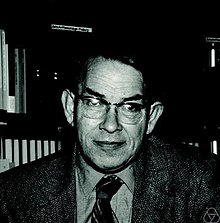Walter Hayman
Walter Kurt Hayman (born Walter Haymann January 6, 1926 in Cologne ; died January 1, 2020 ) was a British mathematician who studied function theory.
Life
Walter Hayman is the son of Franz Haymann (1874–1947), who was a law professor in Cologne, and Ruth Therese Hensel, the daughter of the mathematician Kurt Hensel and his wife Gertrud Hahn. Hayman's father was Jewish and was expelled from his chair by the National Socialists in 1935. In 1938 he went to Great Britain with his family, where Hayman attended the Gordonstoun School in Scotland, founded in 1934 by his relative Kurt Hahn, who also emigrated . He studied at St. John's College at Cambridge University with Mary Cartwright and John Edensor Littlewood, among others, and received his doctorate from Mary Cartwright. Hayman became a Lecturer at King's College in Newcastle upon Tyne in 1947 , became a Fellow of St. John's College in Cambridge and in the same year a Lecturer at the University of Exeter . In 1948 he received the Smith Prize in Cambridge and the Adams Prize (with John Charles Burkill , Subrahmanyan Chandrasekhar and John Macnaghten Whittaker ). In 1949/50 he was visiting professor at Brown University and in the summer of 1950 and 1955 at Stanford University with George Polya . In 1953 he was Reader in Exeter and in 1956 the first professor of Pure Mathematics at Imperial College in London , where he was long over 30 years head of a school of functional theorists. From 1978 to 1981 he was Dean of the Royal College of Science. After his retirement in 1985 he was ten years until 1993 part-time professor at York University and was from 1995 Senior Research Fellow at Imperial College.
As a function theorist , he was known, among other things, for asymptotic results within the framework of the Bieberbach conjecture (1955) and for the Hayman alternative in Rolf Nevanlinna's theory of value distribution . With Wolfgang Fuchs he solved the inverse problem of the Nevanlinna theory (completely solved in 1976 by David Drasin ) for whole functions .
In 1956 he became a member of the Royal Society . In 1955 he received the Berwick Prize and in 1964 he received the Senior Berwick Prize. He received the De Morgan Medal of the London Mathematical Society in 1995 , of which he was Vice President from 1982 to 1984. Hayman was an Invited Speaker at the ICM in 1954 in Amsterdam ( The coefficients of simple and allied functions ) and in 1970 in Nice ( Subharmonic functions in ) . He was a member of the Finnish (1978) and Bavarian Academy of Sciences (1982), the Accademia dei Lincei (1985) and several honorary doctorates (Exeter, Birmingham, Uppsala, Giessen, National University of Ireland in Dublin).
Alan Beardon is one of his PhD students .
He had been married to Margaret Riley Crann since 1947, who had studied mathematics at Cambridge and was known as a mathematics teacher. Inspired by a visit to Moscow, both founded the British Mathematical Olympiad in 1966. The couple have three daughters, including Anne Carolyn Hayman (* 1951), who headed Peace Direct from 2004 . After his wife's death in 1994, Hayman married the mathematician Waficka al-Katifi, who had received her doctorate in 1963 and died in 2001.
Fonts
- Multivalent functions , Cambridge University Press 1958, 1994
- Meromorphic functions , Oxford, Clarendon Press 1964
- Subharmonic Functions , Vol. 1 (with Patrick Brendan Kennedy, who died in 1967), Academic Press 1976 and Vol. 2, Academic Press 1989
- Lectures on approximation and value distribution , Presse Universitaire de Montreal 1982
- Function Theory , in Jean-Paul Pier Development of mathematics 1900-1950 , Birkhäuser 1994
- Research problems in function theory , Athlone Press 1967
- My Life and Functions , Logic Press 2014
Web links
- Homepage at Imperial College
- John J. O'Connor, Edmund F. Robertson : Walter Hayman. In: MacTutor History of Mathematics archive .
Individual evidence
- ^ Hayley Dunning: Tributes paid to Professor Walter Hayman at the launch of his last book. Imperial College London, January 21, 2020, accessed January 23, 2020 .
- ↑ Walter Hayman in the Mathematics Genealogy Project (English)
- ↑ David Drasin, Review, Notices AMS, 2015, No. 5, pdf
| personal data | |
|---|---|
| SURNAME | Hayman, Walter |
| ALTERNATIVE NAMES | Hayman, Walter Kurt (full name) |
| BRIEF DESCRIPTION | British mathematician of German origin |
| DATE OF BIRTH | January 6, 1926 |
| PLACE OF BIRTH | Cologne |
| DATE OF DEATH | January 1, 2020 |

